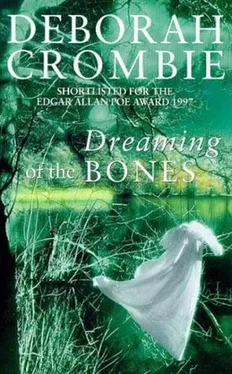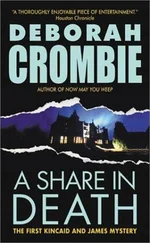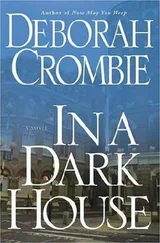Deborah Crombie - Dreaming of the bones
Здесь есть возможность читать онлайн «Deborah Crombie - Dreaming of the bones» весь текст электронной книги совершенно бесплатно (целиком полную версию без сокращений). В некоторых случаях можно слушать аудио, скачать через торрент в формате fb2 и присутствует краткое содержание. Жанр: Детектив, на английском языке. Описание произведения, (предисловие) а так же отзывы посетителей доступны на портале библиотеки ЛибКат.
- Название:Dreaming of the bones
- Автор:
- Жанр:
- Год:неизвестен
- ISBN:нет данных
- Рейтинг книги:3 / 5. Голосов: 1
-
Избранное:Добавить в избранное
- Отзывы:
-
Ваша оценка:
- 60
- 1
- 2
- 3
- 4
- 5
Dreaming of the bones: краткое содержание, описание и аннотация
Предлагаем к чтению аннотацию, описание, краткое содержание или предисловие (зависит от того, что написал сам автор книги «Dreaming of the bones»). Если вы не нашли необходимую информацию о книге — напишите в комментариях, мы постараемся отыскать её.
Edgar Awards (nominee)
Macavity Awards
Dr Victoria McClellan is writing a biography of the tortured poet Lydia Brooke, five years after Brooke's tragic suicide. Victoria becomes immersed in Lydia's life – she cannot believe the poet died by her own hand. So she calls her SI ex-husband for help in the case who receives terrible news…
Dreaming of the bones — читать онлайн бесплатно полную книгу (весь текст) целиком
Ниже представлен текст книги, разбитый по страницам. Система сохранения места последней прочитанной страницы, позволяет с удобством читать онлайн бесплатно книгу «Dreaming of the bones», без необходимости каждый раз заново искать на чём Вы остановились. Поставьте закладку, и сможете в любой момент перейти на страницу, на которой закончили чтение.
Интервал:
Закладка:
“Sherry would be lovely,” Vic said as she hurried after his retreating back, trying to collect herself He was taller than the photographs had shown, and still thin. The dark curling hair had gone mostly gray but was still abundant. The thin face was heavily lined, as if he’d not lived an easy life, and he wore a heavy gray cardigan over his clerical garb. All this she could fit over the image in her mind as one would lay a transparency over a diagram-even the gold-rimmed thick spectacles that gave his blue eyes an owlish look-but nothing had prepared her for the grave sweetness of his smile.
She registered faded lino beneath her feet and dark mustard color on the walls, then he opened a door at the end of the passage and ushered her through. It was warm, amazingly enough, and she sat gratefully in the armchair he indicated.
“If you’ll just excuse me for a moment,” he said, “I forgot to turn the answer phone on, and I’d better do it, else we’ll be interrupted.”
His absence gave Vic a chance to examine the room, and she saw that this was where he had made his mark on the shabby anonymity of the vicarage. A colorful rag rug covered most of the fitted mustard and brown patterned carpet, and deep red velvet curtains covered windows that she thought must overlook the narrow lane beside the church. A fine set of cut crystal glasses stood on the low table before her chair, and the jewel-like reds, greens, and blues winked at her in the light of the gas fire.
Books lined every available bit of wall space, and that, at least, didn’t surprise her.
She had just slipped out of her coat and stretched her feet towards the fire when Adam Lamb returned. He poured her a sherry from the crystal decanter, and when she sipped it she found it fine and very dry, just the way she liked it.
He folded his long body onto the red Victorian love seat opposite her and raised his glass. “Here’s to warmth,” he said with feeling. “I spent five years out in Africa, and I don’t think my blood ever regained its good British fortitude. Sometimes I dream of the sun, and of nights under the mosquito netting. But you don’t want to hear about that.” He gave his disarming smile again and sipped from his glass. “You came to talk about Lydia.”
“You’ve been very kind,” Vic said hesitantly, “and I don’t mean to seem rude, but I had the impression when I rang you before that you didn’t want to talk about Lydia.”
“It wasn’t that I didn’t want to talk about Lydia,” Adam explained. “But, you see, I didn’t know you.”
“Me?”
Adam sat forwards, hands on his knees, his expression earnest. “I didn’t know if you were sympathetic to Lydia. You might even have been-if you’ll excuse the expression-a muckraker. And I couldn’t participate in a book that focused on the more scandalous personal episodes in Lydia’s life rather than her work. ‘The poet as neurotic,’ you know the sort of thing.”
“You talked to Darcy, didn’t you.” It came out as a statement rather than a question. “To check me out.”
“You said you were on the English Faculty when you wrote.” Adam seemed suddenly much preoccupied with examining his fingernails. “So he seemed the obvious person to ask for a reference. I didn’t know you knew Nathan. Personally, I mean, rather than merely as Lydia’s executor.”
“And Darcy told you that I wasn’t academically sound , didn’t he? That I intended writing some hysterical feminist tract.” Vic could feel the hot patches of color burning in her cheeks. She told herself she wouldn’t undo Darcy’s damage by getting angry at Adam, and took a calming breath.
“He didn’t actually say that…” There was an amused twist to Adam’s long mouth, and much to her surprise, Vic found herself smiling.
“He merely implied it.”
“Something like that.” Adam had the grace to look sheepish. “I think I owe you an apology, Dr. McClellan. I’ve lived in Cambridge long enough to know what interdepartmental rivalries are like, and I should have taken it for just that.”
It was best to let it pass, she thought, and give Darcy a piece of her mind at the first opportunity. “You can start by calling me Vic,” she said. “My friends do.”
“And Adam,” he responded. “Call me Adam. My motley flock calls me Father Adam, but there’s no need for you to do so.”
Now that they were so cozily established on a first-name basis, Vic thought she’d better make sure they had no further misunderstandings. “Look… Adam,” she said, and found that the use of his name made solid the link in her mind between the boy in Lydia’s letters and the man sitting across from her. “I think it’s important I make my position clear to you. I don’t intend to focus on the emotional difficulties in Lydia’s life, but I can’t gloss over them, either. There’s not much point in my writing this book if I don’t attempt to portray Lydia as a whole person. Either you take Darcy’s deconstructionist view and hold that no artist’s life is relevant to his work because no one’s life is relevant, period, but is merely a feeble construction by the ego to camouflage our inadequacies…”
Vic took a sip of sherry to wet her lips and continued, “… or you decide that art, or in this case poetry, springs from life and experience and is only truly meaningful in that context. It’s not that I don’t appreciate the power of language-that’s what draws us to poetry in the first place-but I believe that if you see it only as an exercise in style and imagery, you create a moral vacuum.” She found she’d sat so far forwards that she was in danger of sliding off her chair, and that she’d clenched her fingers round the stem of her sherry glass. Setting the glass carefully on the butler’s table, she sat back and said, “I’m sorry. That’s my soapbox, I’m afraid, and I do tend to get a bit carried away.”
“That’s quite all right.” Adam reached out and refilled her glass without asking. “For a moment, I thought I was at college again. We used to have the most marvelous talks. Sometimes we’d walk all night in the courts and along the river, and we debated things with such passion. We thought that we were revolutionaries, that we would change the world.” He said this without cynicism or bitterness, and just for an instant Vic saw him as he must have been, an innocent beneath the sophisticated trappings of a university undergraduate. Was that what had drawn Lydia to him?
“You came from a village, too, didn’t you? Like Lydia.”
Adam smiled. “Only mine was in Hampshire, and had no literary distinction. I remember Lydia telling me the night I met her that she came from a place quite near Virginia and Leonard Woolf’s house. She was quite fascinated by Virginia Woolf.”
“Do you suppose that was the beginning of her interest in Rupert Brooke?”
“It could have sparked it, certainly. She’d read everything she could get her hands on about Bloomsbury, and would have come across a multitude of references to him, even though he was never officially a member of that group.”
A gust of wind rattled the casements behind the red velvet curtains and Vic took another warming sip of sherry. “Bloomsbury, the Neo-Pagans… Why do you suppose Lydia was so drawn to the idea of an intellectually compatible group?”
Adam shifted and recrossed his long legs, and Vic saw that his black lace-up shoes were scuffed and worn down at the heel. “Her background provides the obvious explanation. A fatherless only child growing up in a small village… If she had any real friends, she never spoke of them, so I suppose from the time she learned to read she longed for that sort of companionship.”
“And her mother? Was Lydia really as dutiful a daughter as she sounds in her letters?”
Читать дальшеИнтервал:
Закладка:
Похожие книги на «Dreaming of the bones»
Представляем Вашему вниманию похожие книги на «Dreaming of the bones» списком для выбора. Мы отобрали схожую по названию и смыслу литературу в надежде предоставить читателям больше вариантов отыскать новые, интересные, ещё непрочитанные произведения.
Обсуждение, отзывы о книге «Dreaming of the bones» и просто собственные мнения читателей. Оставьте ваши комментарии, напишите, что Вы думаете о произведении, его смысле или главных героях. Укажите что конкретно понравилось, а что нет, и почему Вы так считаете.












